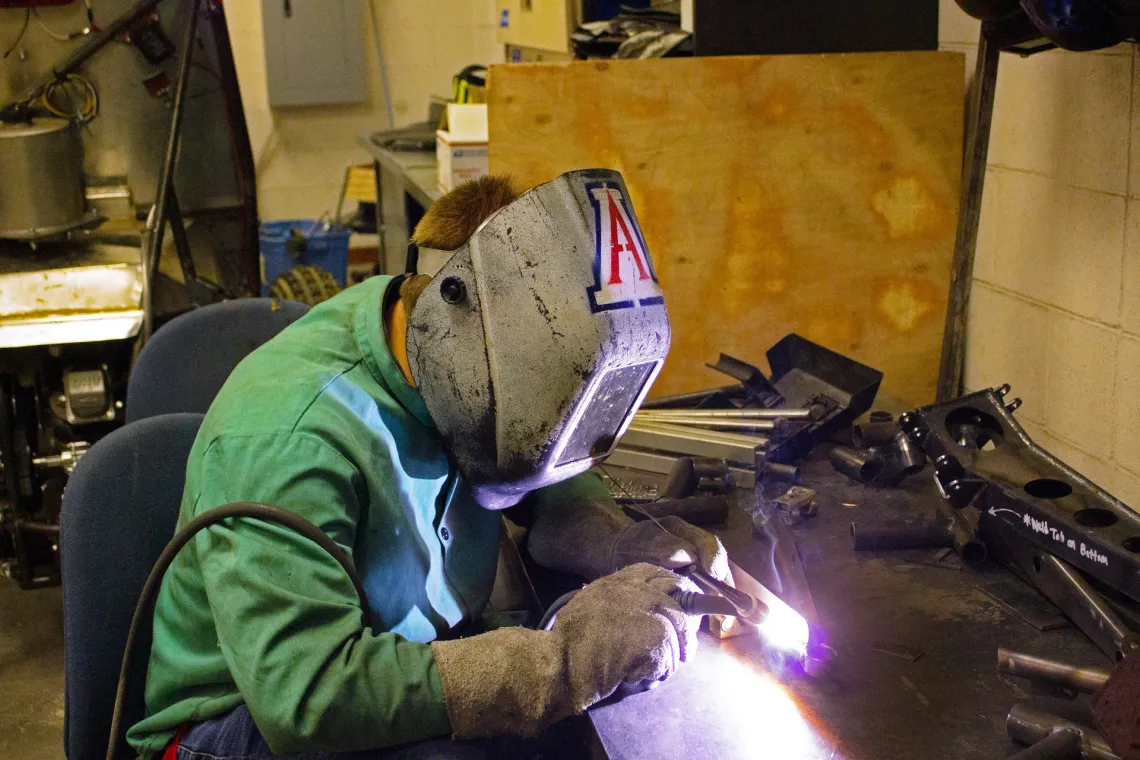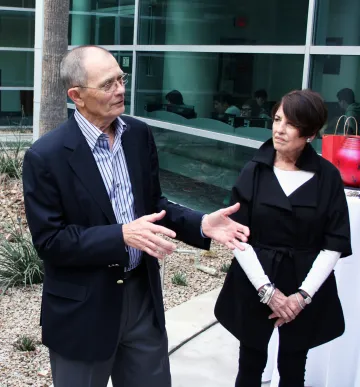Entrepreneurial Powerhouse
A Collaborative Initiative Between Eller and Engineering Increases Opportunities for Students

Engineering Student
Emily Dieckman
Engineering and business students have much to learn from each other — and from coursework that covers both fields. And they should start acquiring that knowledge early. These beliefs are guiding the new Eller-Engineering Entrepreneurship initiative, also known as E3 or E-cubed.
The donor-funded program is projected to reach more than 600 students over the next five years.
During the fall 2022 semester, a mix of engineering and business majors took the first blended-subject course, co-taught by Mark Van Dyke and Mark Peterson. Van Dyke is associate dean of research for the College of Engineering and a professor of biomedical engineering. Peterson is a senior lecturer in entrepreneurship and innovation for the Eller College of Management.
The 200-level class is the first step in a plan that also encompasses a 300-level class, student internships and a joint capstone experience intended to encourage business and engineering collaboration. The program was made possible through a substantial gift from the Muzzy family, which is headed by University of Arizona alumni Jim ’63 ’64 ’16 and Pamela ’64 Muzzy.
Benefits are expected to go beyond the program to boost rankings and enrollment for both colleges, position the university as an entrepreneurial powerhouse and increase opportunities for students in underrepresented groups, ultimately diversifying the top levels of the workforce.
Thanks to the Muzzys’ gift, students will be able to do meaningful paid work for companies that normally might be unable to compensate interns. The family’s gift also funds technology support, faculty education and salaries, student projects, and curriculum development. Both colleges are also contributing financially to help make the program a success.
NEW CONVERSATIONS
Along with others from Engineering and Eller, Van Dyke was a key player in forming the E3 concept, proposing it to the Muzzys and now executing it. He’d like to see his students avoid an outcome common for engineers.
“They develop something they think is really cool and could be the basis for a product. They get sort of tunnel vision around, ‘People are going to love this. Let’s make it into a product and go become tech billionaires.’ But that has been shown to be a path to failure more often than not,” he says.
Pairing future engineers with business students can help them develop more viable paths to success, while the business students can benefit from learning how engineers think and applying that knowledge to the identification of market opportunities, Van Dyke says.
“By blending those two cultures at this stage, it’s easier for them to have conversations, rather than being on these paths where they graduate with very different mindsets and degrees and skill sets,” he says.
Oliver McClean ’24 is an Eller student majoring in operations and supply chain management who took the inaugural class. He enjoyed the experiential elements, including several group projects on topics such as prototype development, minimum viable product validation and accounting and finance for new product development.
“A lot of what I’ve taken from the class is what not to do when starting a business — like, why do so many small businesses fail? Because they’re missing certain aspects on both the business and engineering side,” says McClean, who hopes to start his own business one day.
Not every student will start a business, says Van Dyke and John Sharp ’88, who worked on the E3 concept with him. Sharp is director of the McGuire Center for Entrepreneurship within Eller.
“There’s entrepreneurial methods that we teach that are really applicable to what students will learn if they get a job in industry coming out of the University of Arizona. It better prepares them for that environment, because we are having them apply these concepts,” Sharp says.
Engineering students design products as part of the Craig M. Berge Design Program. Teams of students spend their senior year completing capstone projects and competing for cash prizes from industry sponsors at Craig M. Berge Design Day. Students who develop new intellectual property can co-own it with project sponsors.
Engineering and Eller students also have the opportunity to enter the McGuire New Venture Development Program, a yearlong, team-based program that helps students build new ventures from the ground up. NVD teams compete in annual events for cash prizes, including the McGuire Innovation Expo and the McGuire New Venture Competition. Selected NVD teams often apply for and compete in elite national competitions, such as the Rice Business Plan Competition.
The E3 vision is for students to engage in one or both of the program’s classes, complete internships as early as their second year at UArizona and bring viable ideas to the engineering senior capstone project or the McGuire NVD program.
Sharp aims to see students thinking about entrepreneurship from the first year, so that “by the time they’re juniors and seniors, they’re talking about entrepreneurship like it’s just a normal part of their educational journeys.”
A WORTHY INVESTMENT

Jim and Pamela Muzzy
Eller College of Management
The Muzzy family lives in Southern California and has been a generous supporter of entrepreneurial education at Eller. Family members jointly decide which organizations to support through their foundation, says Steve Muzzy, one of Jim and Pamela’s three sons. “We treat our philanthropy like we would making a personal investment, so we really look for a positive return on investment,” he says.
The E3 initiative made perfect sense as a family venture, Muzzy says. Engineers are full of ideas, and the McGuire Center is the obvious conduit between those with solutions and the consumer marketplace, says Muzzy, who has served the center as a volunteer leader in the past.
In addition to valuing entrepreneurship and the related business acumen that can be applied to any career, the Muzzys feel particularly compelled to help students who have the drive to achieve but may lack the means.
“We have to give back. We’ve been so blessed; it’s natural for us to give back,” Steve Muzzy says.
The Muzzys are also Wildcats. Jim and Pamela earned degrees, Steve and his brothers each attended, and Steve’s niece recently graduated. “The University of Arizona is a special place to the family, because now four generations have been involved,” Muzzy says.

